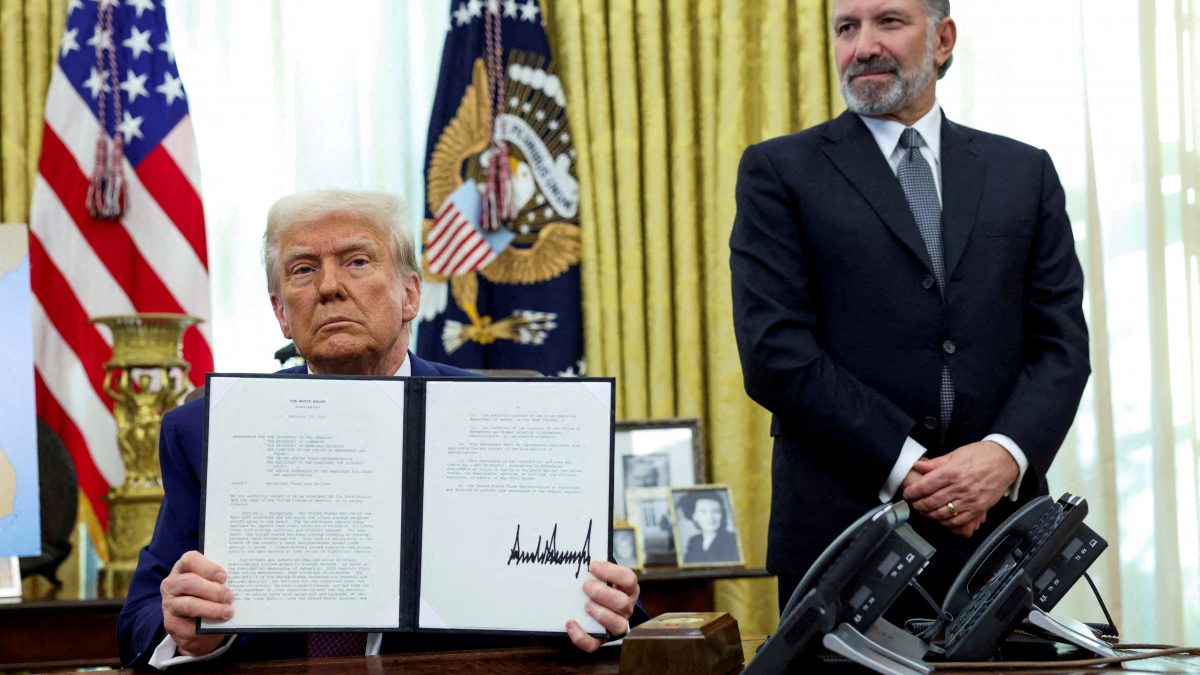President Donald Trump refuses to predict a recession amid stock market fears over his planned tariffs on Mexico, Canada, and China.
In a Fox News interview on Sunday, the Republican president, whose trade policies have reignited concerns about rising prices in the United States, was asked if he expected a recession this year.
“There is a period of transition, because what we’re doing is very big. We’re bringing wealth back to America,” Trump told the “Sunday Morning Futures” program. “It takes a little time, but I think it should be great for us.”
Tariffs have long been a source of anxiety for investors, with many believing they will damage economic development and cause inflation. While Trump admitted as early as February 2 that his broad tariffs will inflict some “short-term” hardship for Americans, his own aides have continually minimised any detrimental impact.
“Absolutely not,” Commerce Secretary Howard Lutnick said on Sunday. “There’s going to be no recession in America.”
Lutnick acknowledged that Trump’s tariffs would raise costs for some foreign-made items in the United States, but claimed that American products would become less expensive.
“He’s not going to step off the gas,” Lutnick said on NBC’s “Meet the Press.”
Last Tuesday, Trump announced new 25% tariffs on imports from Mexico and Canada, as well as new charges on Chinese goods, after declaring that the top three US trade partners had failed to do enough to prevent the flow of deadly fentanyl and its precursor chemicals into the US.
Impact Shorts
More ShortsTwo days later, he exempted many Mexican and Canadian products from the duties for a month, the latest twist in a volatile trade strategy that has spooked markets and fuelled concerns about US inflation and development.
It was the second time in two months that Trump reversed fentanyl-related tariffs on US neighbours.
“If fentanyl ends, I think these will come off. But if fentanyl does not end, or he’s uncertain about it, he will stay this way until he is comfortable,” Lutnick said.
White House officials say Canada and Mexico are conduits for shipments of fentanyl - which is 50 times more potent than heroin - and its precursor chemicals into the U.S. in small packages that are often not inspected.
Public data shows 0.2% of all fentanyl seized in the U.S. comes from the Canadian border, while the vast majority arrives via Mexico. In a concession to Trump, Canada appointed a new fentanyl czar last month.
The exemptions for the two largest U.S. trading partners expire on April 2, when Trump has threatened to impose a global regime of reciprocal tariffs on all U.S. trading partners.
Kevin Hassett, director of the White House’s National Economic Council, said on ABC’s “This Week” that he hoped the drug-related tariffs can be resolved by the end of the month so the focus can be on imposing the reciprocal measures.
Trade confusion
Seesaw tariff announcements have unnerved Wall Street as investors say flip-flopping moves by the Trump administration to roll back levies on trading partners are causing confusion rather than bringing relief.
The Trump trade policies have raised fears of trade wars that could slam economic growth and raise prices for Americans still smarting from years of high inflation.
China said it would “resolutely counter” pressure from the United States on the fentanyl issue after Trump imposed tariffs of 20% on all imports from China.
Democratic senators from two border states criticized Trump’s tariff policy as inconsistent and irresponsible.
“These broad, indiscriminate and on-again, off-again tariffs don’t help anyone. They don’t help farmers. They don’t help auto workers. They’re a mistake,” U.S. Senator Adam Schiff of California said on ABC.
“Pounding Canada as if they’re the exact same thing as China - it just creates this chaotic feeling,” U.S. Senator Elissa Slotkin, of Michigan, said on NBC.
Trump said he put a hold on tariffs on some goods last week because, “I wanted to help Mexico and Canada,” according to the “Sunday Morning Futures” interview, which was taped on Thursday.
The three countries are partners in a North American trade pact that was renegotiated by Trump during his first White House term.
Yet Trump also told the Fox News program that those 25% tariffs “may go up” and he said on Friday that his administration could soon impose reciprocal tariffs on Canadian lumber and other products.
Separately, U.S. tariffs of 25% on imports of steel and aluminum will take effect as scheduled on Wednesday, Lutnick said during the interview. Canada and Mexico are both top exporters of the metals to U.S. markets, with Canada in particular accounting for most aluminum imports.


)

)
)
)
)
)
)
)
)



